University of Haifa
|
אוניברסיטת חיפה جامعة حيفا | |
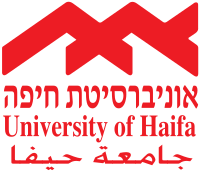 | |
| Motto | מצויינות אקדמית מתחילה ביחס אישי (Hebrew) |
|---|---|
Motto in English | Academic excellence with a personal touch |
| Type | Public |
| Established | 1963 |
| Chancellor | Eliezer Rafaeli |
| President | Ron Rubin |
| Rector | David Faraggi |
Academic staff | 1,323 |
| Students | 18,100 |
| Undergraduates | 8,888 |
| Postgraduates | 7,048 |
| Location | Haifa, Israel |
| Campus | Urban |
| Colors | Red and White |
| Website | www.haifa.ac.il |
The University of Haifa (Hebrew: אוניברסיטת חיפה, Arabic: جامعة حيفا) is a public research university on the top of Mount Carmel in Haifa, Israel.
Overview
The University of Haifa was founded in 1963[1] by Haifa mayor Abba Hushi, to operate under the academic auspices of the Hebrew University of Jerusalem. Haifa University is located on Mount Carmel. In 1972, the University of Haifa declared its independence and became the sixth academic institution in Israel and the fourth university.
About 18,100 undergraduate and graduate students study in the university a wide variety of topics, specializing in social sciences, humanities, law and education.[2] The University is broadly divided into six Faculties: Humanities, Social Sciences, Law, Science and Science Education, Social Welfare and Health Studies, and Education. There is also the Graduate School of Management, The Leon H. Charney School of Marine Sciences and the Continuing Education and Extension Studies.
Beyond the objective of a first-rate higher education, the University of Haifa aims to provide equal educational opportunities to all, and in particular to encourage mutual understanding and cooperation between the Jewish and Arab populations on and off campus.[3] The university is a home for students from all sectors of Israeli society - Jews, Muslims, Christians, Druze, religious and secular students and also many students from all over the world who study in the international school.
The University of Haifa is home to the Hecht Museum of archeology and art, several research centers and institutes, including the Evolution Institute, Center for the Study of the Information Society, Center for the Study of National Security, Tourism Research Center, and more.[4] The University also hosts a large IBM research center on its campus.
History
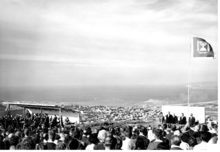
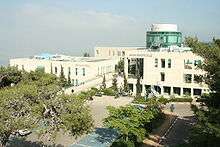
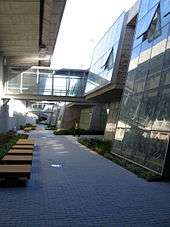
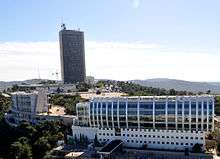
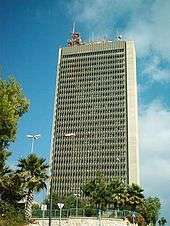
In its first year 472 students attended the University. Studies in Humanities and Social Sciences were offered in the following departments: Biblical Studies, Hebrew Literature and Language, Jewish History, General History, French Literature and Language, English Literature and Language, Arabic Literature and Language, Geography, Sociology, and Political Science. The academic staff included 180 instructors, 50 of them Haifa residents.
In 1967, the University of Haifa awarded diplomas to its first 75 graduates, three-quarters of whom intended to be teachers.
The first home of the University of Haifa was in Erdstein House in the Hadar HaCarmel section of Haifa, but it soon became too crowded. The University moved to Merkaz HaCarmel, and was housed in the building that now serves the Municipal High School No. 5. In 1966, the University moved to the top of Mount Carmel, the present location of its main campus.
The University's first building, the "Multi-Purpose Building", was constructed in 1966. It contained classrooms, halls, laboratories, a library with 110,000 books, and a cafeteria. Brazilian architect Oscar Niemeyer planned the campus to include all the University's facilities in one complex. More recently, additional buildings have been built nearby. Niemeyer did not complete the detailed design phase; instead Shlomo Gilad received the commission for the overall planning of the campus. Gilad retreated from Niemeyer's design, but retained the character of the main building, the Eshkol Building, named for the ex-prime minister Levi Eshkol. The Eshkol Building was the highest building in the city of Haifa until 2002.
The Leon H. Charney School of Marine Sciences
The Leon H. Charney School of Marine Sciences is a division of the University of Haifa that primarily focuses on the study of the Mediterranean Sea. It is home to the Caesarea Center, its own diving facility that also supports the Israeli Antiques Authority in Caesaria.
It focuses on three complementary fields:
- Marine Biology
- Marine Geosciences
- Maritime Civilizations
Notable alumni
- Ashraf Barhom, an Israeli Arab actor
- Gabi Ashkenazi, IDF Chief of Staff
- Meir Dagan, director of the Mossad
- Abdulwahab Darawshe, politician
- Yaakov Edri, politician
- Benjamin Gantz, Chief of General Staff of the IDF
- Carine Goren, Israeli pastry chef, cookbook author, and television baking show host
- Gabriel Hallevy professor of law
- Maya Kalle-Bentzur (born 1958), Israeli Olympic runner and long jumper
- Ram Karmi (born 1931), architect
- Idan Ofer (born 1955), London-based Israeli business magnate and philanthropist
- Bernardo Sorj (born 1948), sociologist
- Yochanan Vollach, footballer, president of Maccabi Haifa, CEO
- Haneen Zoabi, politician
- Dan Harel, IDF general, CEO of the Israeli Ministry of Transportation.
- Yitzhak Aharonovich, Israel's Minister of Internal Security.
- Ronen Bergman, an Israeli investigative journalist and author.
- Moran Samuel, an Israeli Israeli rower and basketball player, won Bronze medal at Rio Paralympics games in 2016
Notable academics
- A. B. Yehoshua (born 1936), novelist, essayist, and playwright
- Gad Barzilai
- Benjamin Beit-Hallahmi
- Nitza Ben-Dov
- David Bukay
- Shay Bushinsky
- Aharon Dolgopolsky
- Nicholas Fisher
- Majid Al-Haj
- Eli Lancman
- Ronit Matalon
- Ronny Reich
- Daniel Schueftan
- Brenda Shaffer
- Saul Smilansky philosopher and Scholar whose main interest is ethics.
- Camelia Suleiman, professor and academic
- Arnon Sofer
- Yuval Steinitz philosopher, the current finance minister of Israel.
- Avigdor Stematsky (1908–89), painter
- Edward Trifonov (born 1937), molecular biophysicist, a founder of Israeli bioinformatics
- Natan Zach (born 1930), poet
See also
- List of universities in Israel
- Global U8 Consortium GU8
- Bucerius Institute for Research of Contemporary German History and Society
References
- ↑ "University of Haifa". ShanghaiRanking Consultancy. Retrieved 10 November 2015.
- ↑ http://www.haifa.ac.il/index.php/en/
- ↑ http://www.haifa.ac.il/index.php/en/
- ↑ http://www.haifa.ac.il/index.php/en/
External links
| Wikimedia Commons has media related to University of Haifa. |
- The University of Haifa homepage (English)
Coordinates: 32°45′45″N 35°01′05″E / 32.76250°N 35.01806°E